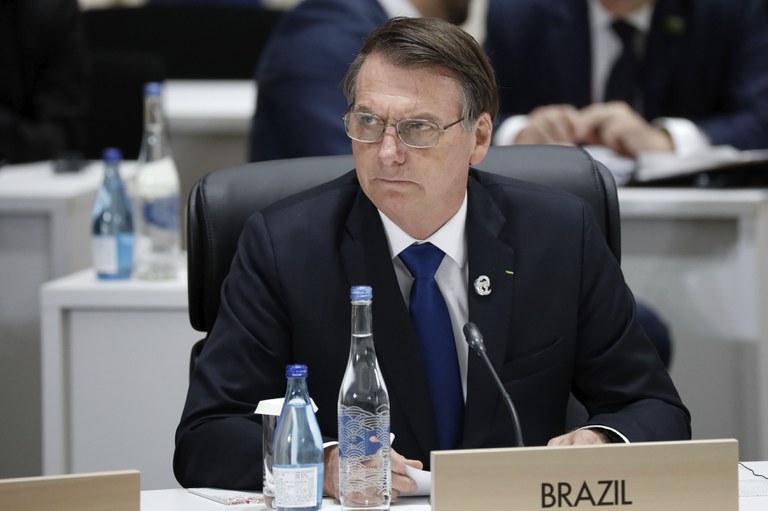Notícias
G20 Cooperation in times of change (The Global Governance Project - 17/06/2019)

Jair Messias Bolsonaro, President, Brazil
A new Brazil will be at Osaka to participate in the G20 summit. The Brazilian people have expressed, in the streets and at the ballot box, unequivocally, their desire for change.
We have left behind a time during which the state was bloated, inefficient, corrupt and permissive about violence. In its place, we are laying down the solid foundations of a lean government, made up of experts committed to balancing the public accounts, restoring the rule of law, and safeguarding the traditions and moral values that are most dear to our people.
This is the same sentiment that champions Brazil’s return to the world stage. Mindful of our traditions and the real needs of Brazilians, we will ensure the necessary autonomy to cooperate with other countries and contribute to a free and stable international order.
And Brazil is in a hurry. In just four months of my government, there are signs that show a clear path forward.
For the first time in decades, the make-up of the ministries has been decided in accordance with strict criteria of executive competence, experience and integrity.
After long years of unsuccessful discussions, we have now presented a project for a comprehensive reform of the social security system. It is estimated to cut more than $250 billion in public spending over 10 years, while protecting the poor and combating privileges.
We have already granted 16 airports, 27 port terminals and a stretch of the North-South Railway to the private sector, with premiums that have exceeded even the best forecasts. By the end of 2019, the projects of infrastructure concessions and privatisation in the Investment Partnership Programme will likely exceed $60 billion.
We have put forward an anti-crime package that tackles the impunity that abetted corruption and crime in our country for too long. We are also debating urgent tax reforms in Congress to simplify the payment of tax and bring back competitiveness.
With these and further measures directed towards openness and elimination of red tape, we will turn the page from the political, economic and moral decay that has plagued Brazil. My government is transforming the system of incentives to encourage competition, entrepreneurship and innovation. The resulting modern business environment will boost economic activity and job creation.
The prosperity of Brazilians, in today’s interconnected world, also hinges on the rescue of our foreign policy. It must, above all, stem from society and reflect its own customs, aspirations, and firm belief in personal freedoms and democracy.
We are thus working to transform the arrangements for South American integration into mechanisms guided by democratic principles and that serve the interests of the peoples of our region.
Our message has been about a more pragmatic and results-oriented integration process, showcased by the very light infrastructure of the recently created Forum for the Progress and Development of South America (PROSUR).
We are also rescuing Mercosul’s vocation for free trade and will prioritise those negotiations already at an advanced stage, including with the European Union, the European Free Trade Association and Canada. We will also start negotiations with Korea, Singapore, New Zealand and the United States.
With the same determination, we wish to join the Organisation for Economic Co-operation and Development without delay. We can only gain from adopting international best practices and exchanges with other countries open to trade and investment flows.
International trade is precisely among the most important items on the G20 agenda. The multilateral trading system needs reform to fulfil its original purpose of opening up markets and promoting the development of its member states.
Unacceptable differences between the rules on agricultural products and those on industrial products have created persistent distortions in the trade of agricultural goods, hindering the progress of many developing countries. Just as we cannot conceive of a reform of the trading system that does not include agricultural goods, we have also been active in negotiating new topics, including services, investment facilitation, small and medium-sized enterprises, and e-commerce.
At a time when commercial tensions demand a renewed consensus on international rules, Brazil is absolutely convinced that the balance of key interests must be secured in order to advance reforms.
Other main issues for the G20 are health and the development of human resources. Brazil endorses the high priority given to them by the Japanese presidency and is ready to present its view on the main challenges for the 21st century. This discussion should include funding and access to services, medicines and vaccines. We also welcome the decision to prioritise issues related to quality education and its contribution towards sustainable development and innovation.
These issues cut across borders and challenge our ability to articulate solutions. The G20 proved its effectiveness as a tool of macroeconomic coordination during the financial crises of the late 1990s and the 2000s. It became a recognised forum for global governance and economic cooperation.
Brazil is confident that, through dialogue and the engagement of its members, the G20 will deliver, in due course, the results that the world expects from us. To achieve their potential, our nations must, from their particular interests and realities, seek consensus and exchange experiences and knowledge. In doing so, I am certain, each and all of our countries will be freer, more prosperous and secure.
This new and vibrant Brazil, spurred by the self-confidence of its people, will take to Osaka the wish to contribute to an equally reinvigorated G20.

